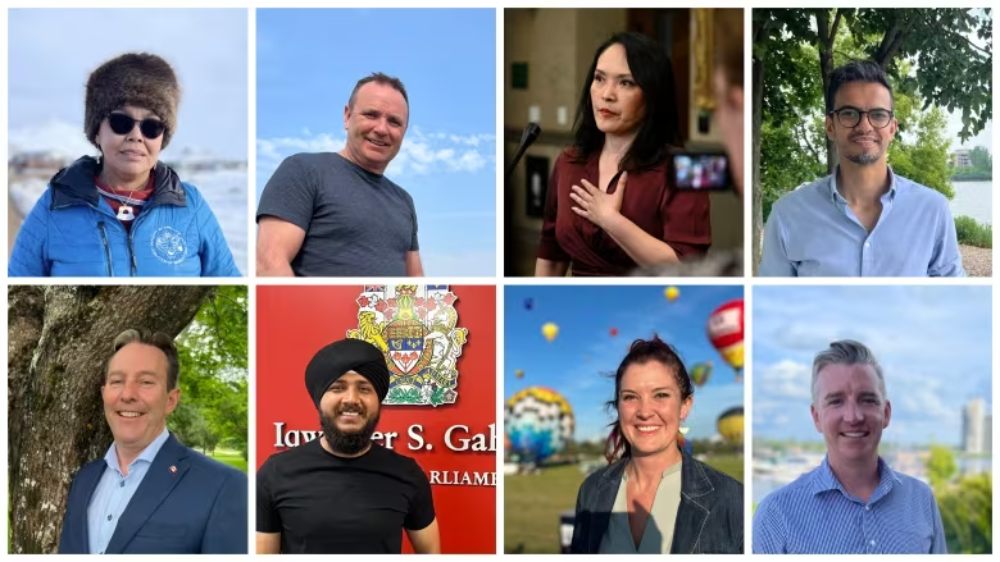A number of MPs say Canada’s democracy is under pressure on a number of fronts, thanks in part to the impacts of social media and extreme partisanship.
But the eight MPs who took part in a series of one-on-one interviews with CBC’s The House over the summer also expressed a hope that changes to the Canadian system, and a deeper understanding of one another, could lead to better politics.
MPs from across the country sat down with CBC reporters for conversations in their home ridings. They aired as a special summer series on The House called “Backbenchers’ backyards.”
Many of the MPs said they’re concerned about the role social media plays in democracy. Several argued it exacerbates differences and gets in the way of constructive conversations.
“This sounds like I’m an old man. And maybe I am. But if I could get rid of one thing in society, it would be the cell phone,” said Conservative MP Stephen Ellis, who represents the riding of Cumberland-Colchester in Nova Scotia.
“Sadly, I use two of them every day.”
Ellis also said this country doesn’t do enough to teach children and young adults how to express sadness and hurt in ways that don’t manifest as anger.
“We need to sit with people and we need to hear them. We need to hear what their words are and understand what their issues are,” he said.
Christine Normandin, a Bloc Québécois MP representing Saint-Jean, also has a jaundiced view of the role social media plays in political life.
“I have a few colleagues of mine who were there in previous elections telling me that if they ever retire from politics, it’s going to be for two reasons,” she said.
“Either they will be old enough, or they will have enough of it because of social media.”
Reaching people in the real world
Several MPs, including Normandin, said they’re trying to combat isolation and other potential effects of social media in a simple way — by meeting people in person.
Liberal MP Sameer Zuberi, representing the Quebec riding of Pierrefonds-Dollard, said he thinks the 2021 election actually helped to bring more people together in a difficult time during the pandemic.
“Our social relationships were strained and I think the fabric of democracy also, as a result of not being in contact, was strained. And so the human contact through connecting with voters in election time … is extremely important,” he said.
For some MPs, the negativity of social media has crossed into both threatened and real abuse.
Jenny Kwan, NDP MP for Vancouver East, said she worries about rising extremism on the right, inspired by former U.S. president Donald Trump.
“I saw how people became very much open to the whole idea of discrimination and racism and and white supremacy openly,” she said. “And I’m seeing some of that, you know, emerging in our community.”
Just as she and CBC reporter Anne Penman were discussing the issue in Kwan’s riding, the MP was confronted by someone who began to shout racist abuse at her, including, “You don’t belong here, Jenny” and “Go home, Jenny.”
“I hope that anger comes from a place of need, for people to be heard and be supported. So I work hard not to take it personally, even though it’s very personal and sometimes very hurtful,” Kwan said.
“I’ve had people say to my face, for example, with COVID-19, that it is the ‘Kwan virus.'”
Kwan’s caucus colleague, Nunavut MP Lori Idlout, said the wave of threats aimed at MPs last year was one of two things that made her fear for Canadian democracy — the other being the 2022 convoy protests.
“MPs as lawmakers need to know that they can do their work without fear, without knowing that their families’ lives are at risk because of what other threats might be given to them,” Idlout said.
While she sometimes feels down about the state of democracy, Kwan said there’s often a simple fix.
“I will come back and I will walk the streets. I’ll reconnect with people, talk to the people,” she said. “Not as a politician, just as a human being. And [I] ground myself. Then I realize why I’m here.”
Reaching out
Many MPs agreed that a sense of dislocation, of being misunderstood or devalued, lies at the heart of some of the anger present in Canadian politics.
Conservative MP Fraser Tolmie spoke at length of how many of his constituents in the Saskatchewan riding of Moose Jaw-Lake-Centre-Lanigan felt alienated by politics in Ottawa.
“They feel frustrated,” he said. “Because, you know, the challenges that they’re facing — they feel like they’re not being heard.”
That view was echoed by his fellow Conservative MP Michael Barrett, in Leeds-Grenville-Thousand Islands and Rideau Lakes, who argued policies like the carbon tax punished activities that people in his riding saw as simply part of their everyday lives and livelihoods.
Tolmie said his job is to make sure he’s listening to his constituents.
“When ego and pride get in the way and it’s my way or the highway, then you’ve lost touch with the people that you represent. And you have to remember that not everybody voted for you,” he said.
Each MP saw slightly different solutions to the problems facing Canadian politics, but many focused on a shift in understanding — and a collective increase in patience and civility.
Liberal Iqwinder Gaheer, the MP for Mississauga-Malton, said he worries about widespread democratic backsliding around the world.
“I think Canada has kept its borders open and kept its heart open,” he said. “That doesn’t mean that we should take it for granted.”
Gaheer, one of several MPs interviewed this summer who immigrated to Canada, made a call for a new shared understanding of common purpose among politicians.
“Essentially, it has to be that understanding that we are not Liberal Canadians, we are not Conservative Canadians, we are not Bloc, NDP — we are Canadians.”
Source : CBC News


